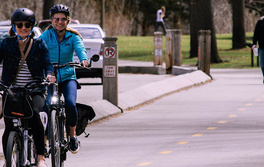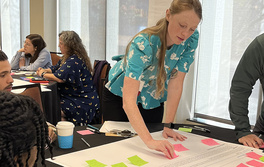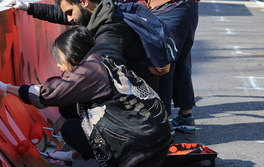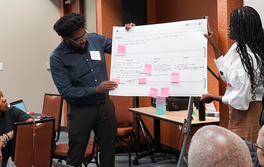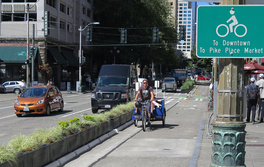
Pittsburgh Launches MovePGH, an Innovative Equitable Mobility Partnership, to Transform Transportation Access through Mobility Hubs
Pittsburgh Launches MovePGH, an Innovative Equitable Mobility Partnership to Transform Transportation Access through Mobility Hubs
Innovate PGH and the Pittsburgh Mobility Collective Join the City in Announcing a First-of-Its-Kind Public-Private-Community Partnership to Make Multimodal Mobility More Equitable, Affordable and Inclusive
The City of Pittsburgh has announced the launch of MovePGH, a new equitable mobility pilot designed to connect residents to accessible mobility options through a digital platform and physically via a multimodal network of mobility hubs.
Move PGH is the first pilot of its kind in the United States and is the culmination of two years of collaboration among the city’s Department of Mobility Infrastructure (DOMI), the Port Authority, Pittsburgh’s bike share Healthy Ride, NUMO and the Pittsburgh Mobility Collective (PMC), a consortium of private, “last-mile” mobility service providers. Move PGH aims to address lack of access to safe, reliable mobility, which impacts Pittsburgh residents’ ability to get where they need to go — to get groceries, get to work or go to school — without relying on a car. Nearly a quarter of Pittsburgh residents do not have access to a car, which directly limits their economic mobility, as only about 40% of the region’s jobs are accessible within a 90-minute commute.
Critical to this pilot is the innovative, inclusive approach: Move PGH is unique in that it brings together a diversity of partners, including government agencies, private mobility operators, academic institutions and local organizations, to build a mobility ecosystem that meets the needs of all Pittsburgh residents, especially those from underserved and lower-income neighborhoods.
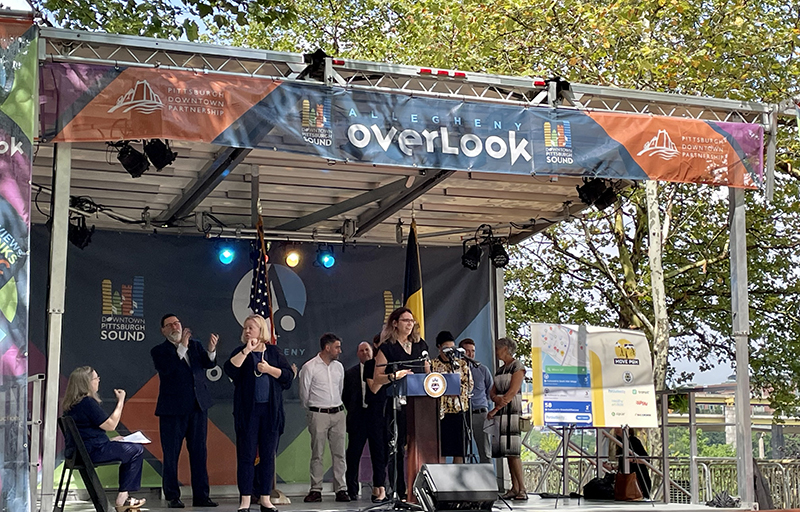
“Tackling systemic transportation inequities means addressing how lack of access to transportation options limits access to jobs, inhibits economic mobility and makes it challenging for residents to get where they need to go safely, conveniently and affordably,” said NUMO director Harriet Tregoning of the Move PGH pilot. “With the launch of the city’s mobility hub network, and by collaborating with public transit, bike share and a diverse suite of mobility services options, Pittsburgh is demonstrating its commitment to building an integrated, multimodal transportation system that is accessible to all and can lead to more equitable outcomes.”
During a 2019 ambition workshop in Pittsburgh’s Hazelwood neighborhood, NUMO convened the pilot stakeholders to set goals and define a vision for what an equitable, integrated mobility network could look like for the city. To manage local and national coordination of partners while prioritizing engagement of community-based organizations NUMO provided funding and guidance to InnovatePGH, a next generation, public-private partnership powered by a coalition of civic institutions representing the region’s university, business, philanthropic and government leadership.
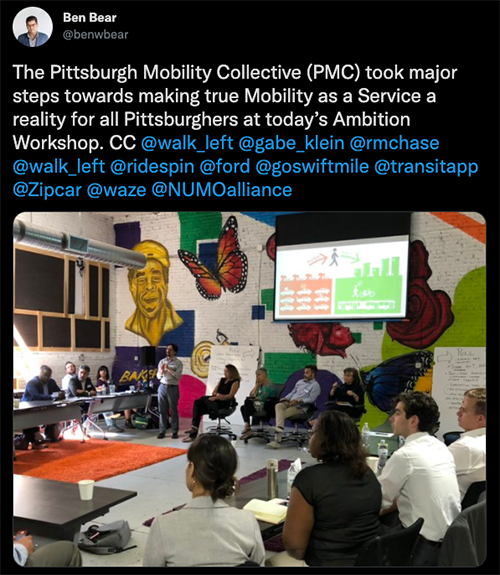
Move PGH integrates transit and shared mobility via physical and digital mobility hubs, making multimodal travel in the city and connecting to transit and bike share convenient using existing and new services like:
- A new fleet of shared low-speed electric scooters provided by Spin
- Expanded carshare services provided by Zipcar
- A fleet of electric mopeds by Scoobi
- Carpool matching and commuting services facilitated through Waze Carpool
- Electric charging for e-scooters provided by Swiftmile
- Real time transit and mobility information on TransitScreens at mobility hubs
- Trip planning and most trip booking available through Transit
These services will be available through a network of 50 mobility hubs, which are being installed near public transit stops and bike share stations around the city. The locations for some of these mobility hubs were selected based on data and research from the Port Authority and Carnegie Mellon University’s Mobility21 Center that identified transit equity zones, or areas where mobility hubs can expand access to destinations like jobs and grocery stores. “What we’re trying to do with this [pilot] is give people Plan B, C and D,” said Karina Ricks, director of DOMI during the Move PGH launch event held at Allegheny Overlook on July 9, 2021.
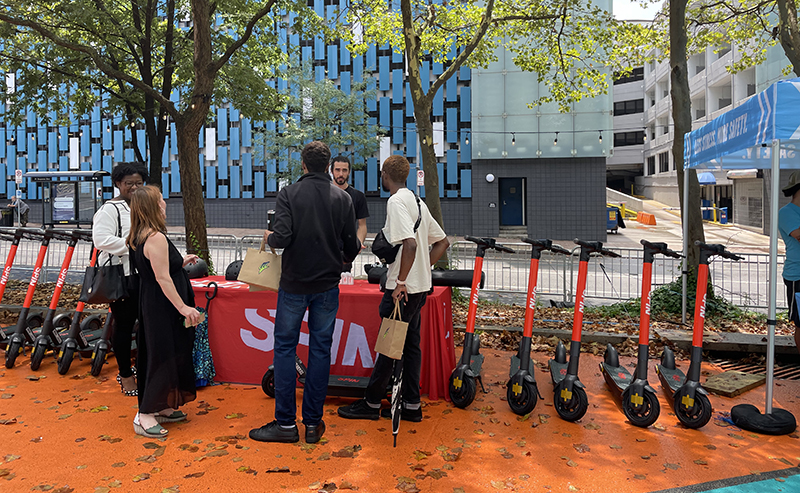
In addition to this pilot, Pittsburgh is considering how its infrastructure can better support safe, short trips on foot, by bicycle, on scooters and using other modes of transportation. Of critical importance to the city is that residents of all ages, abilities and income levels must be able to achieve access to their daily needs, jobs, health services and education within short distances and without needing to use a car. DOMI recently released Pittsburgh’s first Pedestrian Safety Action Plan, as well as MoveForwardPGH, an initiative to implement the Bike(+) Master Plan, which aims to add 150 miles of bike infrastructure over the next decade to accommodate more low-speed travel modes that will allow more people to move safely, conveniently and joyfully.
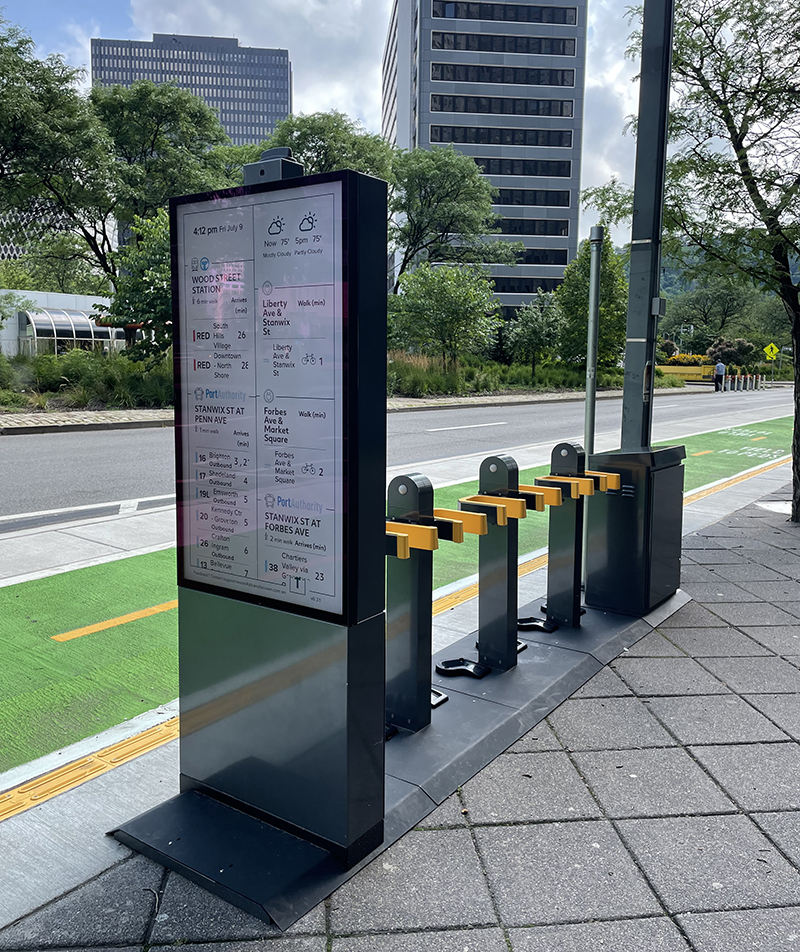
The launch of Move PGH also enables the city’s Universal Basic Mobility (UBM) pilot, which will provide up to 100 low-income residents with monthly transit subscriptions and shared mobility services to address mobility insecurity for a period of six months. The UBM pilot will help the city achieve its goal of providing those in need with greater access to opportunity. Speaking at the launch event, executive director of the Manchester Citizens Corporation Lashawn Burton Faulk also connected the importance of UBM and Move PGH in filling mobility gaps and expanding access to new mobility services to communities of color, which face significant mobility challenges: “Universal basic mobility is a human right. Easy access to affordable, reliable, convenient transportation choices impacts a person's life more than nearly anything else… Low- [and] moderate- income communities of color deserve access to these new technologies as much as any other community.”
"Transportation mobility is key to economic mobility and a major determinant in household health, education and welfare,” said Pittsburgh Mayor Bill Peduto during the launch. “In Pittsburgh, too many residents are one missed bus or one flat tire away from losing their job or missing a critical appointment. Universal Basic Mobility, using the services of Move PGH, will demonstrate that when people have a readily available transportation backup plan they are able to access more opportunities and climb the economic ladder.”
Please direct media inquiries to Madlyn McAuliffe at madlyn@numo.global.
NUMO, the New Urban Mobility alliance, is a global organization that channels tech-based disruptions in urban transport to create joyful cities where sustainable and just mobility is the new normal. Founded in 2019 as an outgrowth of the Shared Mobility Principles for Livable Cities, NUMO convenes diverse allies and leverages the momentum of significant revolutions in mobility to target urban issues — including equity, sustainability, accessibility and labor — impacted by the shifting transportation landscape. NUMO is hosted by WRI Ross Center for Sustainable Cities.
